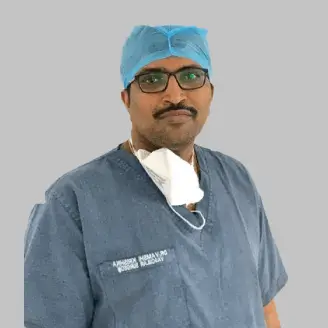-
Doctors
-
Specialities & Treatments
Centre of Excellence
Specialties
Treatments and Procedures
Hospitals & Directions HyderabadCARE Hospitals, Banjara Hills CARE Outpatient Centre, Banjara Hills CARE Hospitals, HITEC City CARE Hospitals, Nampally Gurunanak CARE Hospitals, Musheerabad CARE Hospitals Outpatient Centre, HITEC City CARE Hospitals, Malakpet
HyderabadCARE Hospitals, Banjara Hills CARE Outpatient Centre, Banjara Hills CARE Hospitals, HITEC City CARE Hospitals, Nampally Gurunanak CARE Hospitals, Musheerabad CARE Hospitals Outpatient Centre, HITEC City CARE Hospitals, Malakpet Raipur
Raipur
 Bhubaneswar
Bhubaneswar Visakhapatnam
Visakhapatnam
 Nagpur
Nagpur
 Indore
Indore
 Chh. Sambhajinagar
Chh. SambhajinagarClinics & Medical Centers
Book an AppointmentContact Us
Online Lab Reports
Book an Appointment
Consult Super-Specialist Doctors at CARE Hospitals

Mesenteric Ischemia
Mesenteric Ischemia
Mesenteric Ischemia Treatment In Hyderabad, India
A narrowed or blocked artery can block the flow of blood to your small intestine, leading to mesenteric ischemia. This chronic condition damages the small intestine permanently. When blood clots slice through the small intestine, a blood clot causes sudden mesenteric ischemia. It requires immediate surgery. Patients with chronic mesenteric ischemia are treated either by angioplasty or through open surgery.
CARE Hospitals offer support following treatment for mesenteric ischemia from a team of specialists. We can also help you create a heart-healthy lifestyle that will prevent additional cardiovascular problems. The doctor monitors you for conditions that can lead to plaque build-up in the arteries, such as high blood pressure and unhealthy cholesterol levels. The doctor checks your blood sugar levels if you have diabetes.
What are the different types of this condition?
There are two forms of mesenteric ischemia:
- Acute mesenteric ischemia: Similar to how heart attacks and strokes result from critical artery blockages, acute mesenteric ischemia occurs suddenly due to blood clots, leading to severe symptoms. This condition is a medical emergency requiring immediate attention.
- Chronic mesenteric ischemia: This form develops gradually as mesenteric arteries narrow over time. Unlike the abrupt onset of acute mesenteric ischemia, chronic mesenteric ischemia progresses more slowly, with symptoms worsening gradually.
Symptoms of Mesenteric Ischemia
- Acute mesenteric ischemia: An acute form of mesenteric ischemia may present with the following symptoms:
-
The abdominal pain was severe and sudden.
-
The need for a bowel movement was urgent.
-
Fever.
-
Nausea and vomiting.
-
- Chronic mesenteric ischemia: Chronic mesenteric ischemia manifests as the following signs and symptoms:
-
Around 30 minutes after eating, you experience abdominal pain.
-
Over the next hour, the pain worsens.
-
It subsides within half an hour to an hour and a half.
-
Causes of Mesenteric Ischemia
The small intestine is deprived of blood in both acute and chronic mesenteric ischemia. A blood clot in the main mesenteric artery is the most common cause of acute mesenteric ischemia. Blood clots usually originate from the heart. Most chronic forms of heart disease are caused by plaque build-up in the arteries.
Different types of mesenteric ischemia have distinct causes:
- Acute Mesenteric Ischemia: Atherosclerosis, the accumulation of plaque in arteries causing hardening, is a common cause. Plaque rupture can lead to blood clot formation, causing blockages in three ways:
- Clot formation within mesenteric arteries (15%-25% of cases).
- Clot dislodgment from another body part, obstructing a mesenteric artery (50% of cases).
- Clot formation in nearby mesenteric veins (5% of cases), often associated with conditions promoting excessive blood clotting.
- Non-occlusive mesenteric ischemia (NOMI), accounting for about 20% of cases, occurs without blockages. It results from blood vessel constriction or muscle spasms due to factors such as certain medications, medical procedures, or health conditions like sepsis, heart attack, dehydration, and allergic reactions. Acute NOMI progresses more gradually but poses a significant risk.
- Chronic Mesenteric Ischemia: Primarily caused by circulatory diseases leading to the narrowing (stenosis) of blood vessels over time. Another factor is the formation of a blood clot in a mesenteric blood vessel, growing in size over days or weeks, exacerbating symptoms. While not immediately life-threatening, approximately 40% of acute mesenteric ischemia cases stem from chronic symptoms. Early signs of narrowed blood vessels can suddenly worsen when a new clot obstructs the already constricted vessels.
Diagnosis of Mesenteric Ischemia
If you have pain after eating that causes you to limit food and lose weight, your doctor might suspect you have chronic mesenteric ischemia. Confirmation of the diagnosis might be achieved by a narrowing of the major arteries leading to the small intestine.
The following tests may be conducted:
-
Angiography. To determine if your small intestine arteries have narrowed, your doctor may recommend a CT scan, MRI or X-ray of your abdomen. When a contrast dye is added during an angiogram or CT scan (or magnetic resonance angiography), the narrowing can be pinpointed.
-
Doppler ultrasound. Sound waves evaluate blood flow, which indicates a narrowing of arteries without invasive methods.
Treatment of Mesenteric Ischemia
In both chronic and acute mesenteric ischemia, the goal is to re-open the artery to make sure your intestine is receiving adequate blood flow. Despite this, permanent damage can occur if it is not addressed soon. Depending on your condition, your vascular surgeon will determine whether an emergency procedure is needed or if an elective procedure (scheduled procedure) is recommended.
In Acute Cases:
-
To relieve severe pain, narcotic pain medications may be prescribed.
-
The procedure is usually an emergency as severe intestinal damage is likely to occur quickly.
-
A thrombolytic procedure may be recommended by your vascular surgeon if a clot is found early. During the procedure, a medication that dissolves clots in a blood vessel is injected, and the procedure is often performed simultaneously with a diagnostic angiogram.
-
A surgical procedure may be necessary to remove the clot and restore blood flow to your intestinal arteries if there is intestinal damage or not enough time for the thrombolytic agent to work.
-
Damaged parts of the intestine may need to be removed during surgery. Often, your vascular surgeon will make this decision together with other surgeons.
In Chronic Cases:
-
The use of minimally invasive endovascular treatments has become the primary treatment approach. Angiograms can sometimes be performed simultaneously with balloon angioplasty and stenting to eliminate the second procedure and start treatment as soon as possible. This procedure involves inserting a tiny balloon inside the narrowed artery. A balloon is inflated and deflated by your vascular surgeon to push plaque against the artery wall. After your vascular surgeon widens the artery, a stent is inserted. The stent is an artificial device that supports the walls of the artery and helps it to remain open.
-
The bypass procedure is recommended if you are ineligible for angioplasty or stenting. Vascular surgeons create a route around narrowed or blocked sections of the affected arteries. In order to restore adequate blood flow to your intestines, a vein or a synthetic tube is used as a graft, sewn-in above and below the blocked area.
Our Doctors
-

Dr. Tarun Gandhi
MS, FVES
Vascular & Endovascular Surgery
View More -

Dr. P C Gupta
MBBS, MS, FICA, FIVS (Japan)
Vascular & Endovascular Surgery
View More -

Dr. Ashish N Badkhal
MBBS, MS, MCh
Vascular Surgery
View More -

Dr. Ashok Reddy Somu
MBBS, MD, FVIR
Vascular & Interventional Radiology
View More -

Dr. B. Pradeep
MBBS, MD, DNB, FRCR CCT (UK)
Vascular & Interventional Radiology
View More -

Dr. Mustafa Razi
MBBS, MD
Vascular & Interventional Radiology
View More -

Dr. N. Madhavilatha
MBBS, MS, PDCC
Vascular & Endovascular Surgery
View More -

Dr. Radhika Malireddy
MBBS, DNB (General Surgery), DrNB (Plastic & Reconstructive Surgery), Post-Doctoral Fellowship in Diabetic Foot Surgery
Vascular & Endovascular Surgery
View More -

Dr. Rahul Agarwal
MBBS, DNB (General Surgery), FMAS, DrNB (Vasc. Surg)
Vascular & Endovascular Surgery
View More -

Dr. Rajesh Poosarla
MBBS, MD, DNB, DM (Gold Medalist), EBIR, FIBI, MBA (HA)
Interventional Radiology
View More -

Dr. S. Chainulu
MBBS, DNB (Radio-Diagnosis)
Vascular & Interventional Radiology
View More -

Dr. Sadath Ahmed
MBBS, DrNB (CTVS)
Cardiac Surgery, Vascular Surgery
View More -

Dr. Sailaja Vasireddy
MBBS, DrNB (CTVS)
Cardiac Surgery, Vascular Surgery
View More -

Dr. Santhosh Reddy K
MBBS, MD
Radiology
View More -

Dr. Sudheer Gandrakota
MBBS, DNB, CTVS
Cardiac Surgery, Vascular Surgery
View More -

Dr. Surya Kiran Indukuri
MBBS, MS (General Surgery), DrNB (Vascular & Endovascular Surgery)
Vascular & Endovascular Surgery
View More -

Dr. V. Apoorva
MBBS, MS (General Surgery), DrNB Vascular surgery
Vascular & Endovascular Surgery
View More -

Dr. Vamsi Krishna Yerramsetty
MBBS, DNB, FIVS
Vascular & Endovascular Surgery
View More -

Dr. Venugopal Kulkarni
MBBS, MS, MRCS, FRCS
Vascular & Endovascular Surgery
View More -

Dr. Vivek Lanje
MBBS, DNB (General Surgery), Mch (Cardiovascular & Thoracic Surgery)
Vascular Surgery
View More
Frequently Asked Questions
Couldn’t find what you were looking for?
Need any help? Get a Call Back.

Still Have a Question?

